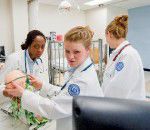Nursing is a profession of the senses and of sensibility

December 6, 2016
At 4:45 a.m. on the dot, the song that my roommate has grown to dread plays, introducing both its upbeat melody and the start of my Monday. Today is one of the two clinical days I have in my week. It is the day I travel with my nursing clinical group to healthcare facility in Pjiladelphia to take care of patients, interact with and learn from real healthcare professionals and set foot onto the mysterious backstage scene of the hospital. Though I am comfortable in this so-called real world setting by this point of the semester, I vividly remember the first few times when I felt cast into the unfamiliar abyss of medical and clinical knowledge that I had not yet acquired and only seemed to grow before me.
On a campus like Villanova, teeming with discussion of rich ideas, I expect it is rare that no one has heard “I think, therefore I am.” This is the most certain truth that Descartes could establish—because he knows he is something, he cannot possibly be nothing. Beyond the profound reasoning behind that universally accessible truth, however, Descartes proceeds to plant your garden-variety of doubts. To doubt your senses, your memory, your own body and your own mind is the progression he tempts us to follow.
Strangely enough, when I had barely begun my first day of clinical, Descartes and his ideas were what intruded my mind seemingly out of the blue. His thought experiment intended to isolate what he could know without a doubt—but all he was left with was his existence. He could not know for certain how reliable his senses could be. This is the diametrical opposite of what the profession of nursing rightly assumes as part of its inherent philosophy. While Descartes was guided by doubt to arrive at what is indubitable and eliminate things like human senses in the process, nursing is guided by trust that our senses and our bodies, our sensibility and our minds are the instruments with which the entire profession is built.
Indeed, the undiscussed crux of nursing is trust—trust in the senses of human beings as indicators of something that is knowable, trust in the human senses as reliable sources of information, trust that the senses of the human being lying in the bed in front of you will be a sufficient guide to their own health. In nursing, the human being becomes the measurer of empirical data about a delicate human state is gathered and used as a foundation of further clinical decision making. Nursing promises that we can trust our own body to be a body of truths. Even more than that, human beings are not only capable of discerning truths, but are sources of them.
My clinical day entails taking vital signs, giving injections, and performing full body assessments among other things. In all these tasks, my senses suddenly become the machine that collects information—information that is assumed as being correct because everyone assumes that I know what I saw, heard, smelled and felt by touch. I remember wondering how I could possibly be entrusted with this task, this trust. How do I know I counted the correct number of pulses in the radial artery? How can I just trust that when I put my stethoscope over the apex of my patient’s heart and count the number of beats per minute, I am hearing correctly? How do I know I am not missing anything?
Beyond this, nursing necessitates that we trust our patients’ bodies as reliable sources of information. When their abdomen is distended and rounded upon inspection, or their lower extremities are cool upon palpation or their lungs wheeze and crackle upon auscultation, I need trust not only what I have witnessed, but what the patient is presenting to me. When the patient tells me that they feel severe pain, I trust the patient’s experience to be an indicator to something worthy of being explored. What I witness is data as legitimate as something I research in a scholarly journal, just like what the patient experiences is a piece of the complete problem that is equally as important as the pieces in a mathematics word problem.
The job presented at every turn in a day of nursing is one that depends on the body and mind, the senses and sensibility of those involved. Contrary to the skepticism that so permeates and corrupts people’s trust, nursing teaches and functions on the basis that the nurse and the patient alike are reliable sources of evidence. It teaches that the imperfect human body is not something that unfortunately interferes with the accuracy and precision of machines, but rather that the human being can be looked upon as the most telling, quite literal body of empirical knowledge.

